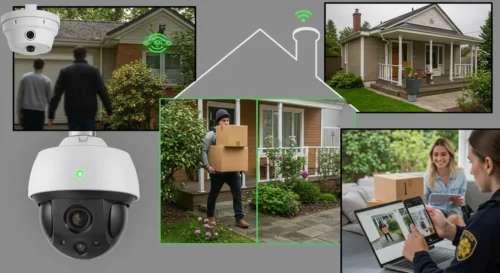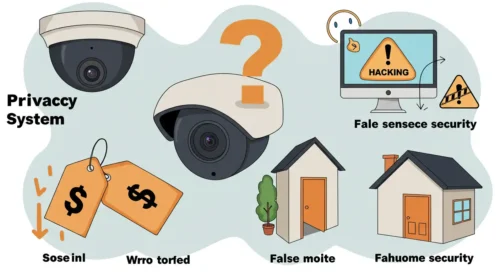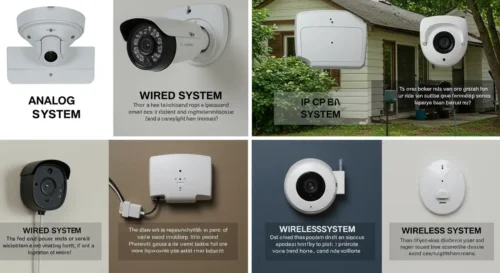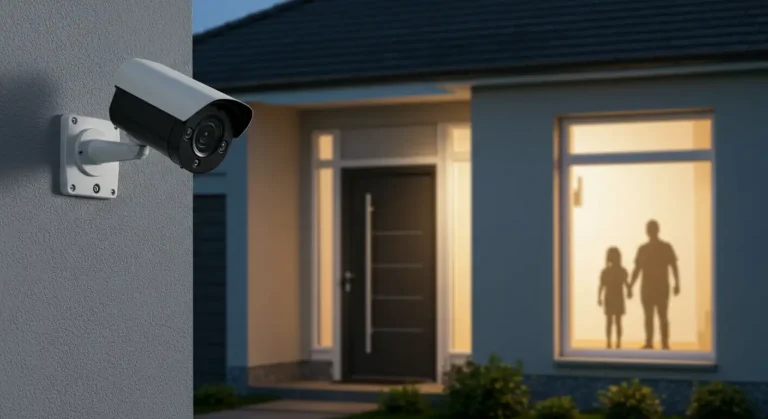In today’s world, home security is paramount. As we spend more time away from our properties, protecting loved ones and belongings has fueled demand for effective solutions. Closed-Circuit Television (CCTV) systems have become a popular, though sometimes debated, option for enhancing security at home. This comprehensive guide provides a balanced overview of home CCTV systems, exploring their advantages and disadvantages. We’ll cover the various types of systems, key factors to consider when choosing one, practical installation and maintenance tips, and important legal and ethical considerations. By the end, you’ll be well-informed to decide if a CCTV system is right for your home.
Is CCTV a Good Idea for Home Security? A Comprehensive Guide
CCTV, or closed-circuit television, is a system of cameras and monitors that allows you to keep an eye on your property remotely. It can be used to deter criminals, monitor your home while you’re away, and even provide evidence in the event of a crime.
I. Introduction
In this article, we’ll explore seven compelling reasons why installing CCTV at home is a smart idea in 2025. From deterring crime to providing peace of mind, CCTV offers a wide range of benefits that make it an invaluable investment for any homeowner.
-
Deterring Crime: The mere presence of CCTV cameras can be enough to deter potential criminals from targeting your home. Knowing that they are being watched, criminals are less likely to risk breaking into a property.
-
Monitoring Your Home While You’re Away: Whether you’re on vacation or simply at work, CCTV allows you to keep an eye on your home remotely. This can be especially useful for monitoring children, pets, or elderly family members who may be at home alone.
-
Providing Evidence in the Event of a Crime: If a crime does occur at your home, CCTV footage can provide valuable evidence to law enforcement. This can help them identify and apprehend the perpetrators.
-
Increasing Your Sense of Security: Knowing that your home is being monitored can give you a greater sense of security and peace of mind. This can be especially important for those who live alone or in high-crime areas.
-
Reducing Insurance Costs: Some insurance companies offer discounts to homeowners who have CCTV systems installed. This is because CCTV can help to reduce the risk of theft and vandalism.
-
Improving Home Safety: CCTV can also be used to monitor other areas of your home, such as the backyard, garage, or swimming pool. This can help to improve overall home safety and prevent accidents.
-
Increasing Property Value: Homes with CCTV systems are often more attractive to potential buyers. This can help to increase the value of your property.
As you can see, there are many reasons why installing CCTV at home is a smart idea in 2025. If you’re serious about protecting your home and family, CCTV is an investment that you should definitely consider.
II. The Pros of Home CCTV Systems

CCTV systems offer numerous benefits, enhancing home security and providing peace of mind. Let’s explore these advantages:
-
Enhanced Security: A CCTV system acts as a constant guardian for your home. It provides continuous surveillance, recording activity and deterring intruders. Modern systems often include motion detection, sending real-time alerts to your smartphone about any unusual activity. This allows you to immediately check the live feed, contact neighbors, or alert authorities. For example, if an Amazon package is delivered while you’re away, you can verify its safe placement. If someone suspicious lingers near your property, you’ll be instantly notified. CCTV at home is also invaluable for monitoring vulnerable family members, such as children playing in the backyard or elderly relatives needing assistance.
-
Crime Deterrent: Visible CCTV cameras are a powerful crime deterrent. Burglars are less likely to target a property under surveillance. The risk of identification significantly reduces the appeal of a break-in. While isolating statistics on CCTV’s deterrent effect is challenging, anecdotal evidence and security professional studies suggest that CCTV at home contributes to reduced burglaries and vandalism. Criminals prefer easier targets.
-
Evidence Gathering: If a crime occurs, CCTV footage is invaluable. Recordings provide a visual record, capturing crucial details like the perpetrator’s identity, entry method, and the crime’s timeline. This evidence helps law enforcement identify and apprehend those responsible. CCTV at home footage is also essential for insurance claims, providing concrete proof of the incident and the loss. It can even help resolve disputes with neighbors, offering an objective account of events.
-
Remote Monitoring and Peace of Mind: Modern CCTV systems allow you to monitor your home remotely. Through mobile apps or web interfaces, you can access live feeds and recorded footage from anywhere with an internet connection. This provides unparalleled peace of mind, especially when you’re away. You can check on your property anytime, ensuring its safety. Knowing you can monitor your CCTV at home can significantly reduce anxiety.
III. The Cons of Home CCTV Systems

While CCTV at home offers many benefits, it’s vital to acknowledge potential drawbacks. A balanced perspective is key to informed decisions.
-
Privacy Concerns: Home CCTV systems raise privacy issues. Cameras can capture footage of family, guests, and passersby. Who has access? How is it used and stored? Responsible use is crucial. Carefully place cameras, avoiding areas where privacy is reasonably expected, like bathrooms or bedrooms. Be transparent with family and guests about the cameras and how footage is handled. Local laws may require notification and consent for video surveillance. Some homeowners use dummy cameras as a deterrent without the privacy implications.
-
Cost and Maintenance: Purchasing and installing a home CCTV system can be expensive, depending on complexity, equipment quality, and whether you hire professionals. Ongoing costs include maintenance, cloud storage subscriptions, and potential repairs. Hidden costs can arise, like specialized cabling, network upgrades, or professional monitoring. Thorough research and multiple quotes are essential to understand the full financial commitment.
-
False Sense of Security: Relying only on CCTV at home can create a false sense of security, causing homeowners to neglect other security measures. CCTV is one part of a comprehensive strategy. It shouldn’t replace strong locks, well-lit exteriors, alarm systems, and community engagement. Over-reliance can create vulnerability if the system malfunctions or an intruder bypasses it. A multi-layered approach is most effective.
-
Technical Issues and Vulnerabilities: CCTV systems are susceptible to technical problems. Cameras can malfunction, equipment can fail, and networks can be disrupted. Internet-connected systems are vulnerable to hacking. Cybercriminals may access your feeds, compromising privacy and security. Choose reputable brands with robust security features. Regularly update firmware, use strong passwords, and implement network security best practices, including data encryption and secure Wi-Fi. Consider consulting a cybersecurity professional.
IV. Types of CCTV Systems

CCTV at home offers a range of options to fit different needs and budgets. Understanding the types of systems is key to making the right choice.
-
Analog vs. IP Systems: Analog systems, the traditional type, transmit video over coaxial cables. They’re cheaper upfront but offer lower image quality and fewer features than IP (Internet Protocol) systems. IP systems transmit video digitally over a network, providing superior resolution, advanced features like remote viewing and motion detection, and better scalability. While IP systems have a higher initial cost, their long-term benefits often make them a good investment for a home CCTV system.
-
Wired vs. Wireless Systems: Wired systems connect cameras to the recorder with cables. They’re generally more reliable and less prone to interference but can be harder to install, requiring cable runs. Wireless systems offer more flexibility in camera placement and easier installation but can experience signal interference and may need more maintenance. For a home CCTV system, consider the balance between reliability and ease of setup.
-
Different Camera Types: Various camera types serve specific needs. Dome cameras are common indoors due to their discreet design and wide field of view. Bullet cameras are typically used outdoors, offering a visible deterrent and weather protection. PTZ (Pan-Tilt-Zoom) cameras allow remote control of the viewing angle and zoom, great for monitoring large areas. Other options include night vision cameras for low-light conditions and fisheye cameras for 360-degree views. For CCTV at home, consider which camera types best suit your property layout and security goals. Some modern IP cameras also offer smart home integration, connecting to systems like Alexa or Google Home.
V. Choosing the Right CCTV System for Your Home
Selecting the right CCTV system involves carefully considering your individual needs, budget, and property characteristics.
-
Factors to Consider: Several key factors should guide your decision. Budget is a primary consideration, as CCTV systems range from basic, affordable setups to high-end, feature-rich options. The size of your property will determine the number of cameras needed and their placement. Consider the areas you want to monitor most closely, such as entry points, driveways, and backyards. Desired features like night vision, motion detection, remote viewing, and cloud storage should also be factored in. Think about whether you prefer a wired or wireless system, and whether you want to install it yourself or hire a professional.
-
Recommendations: For homeowners on a tight budget, basic analog systems with a few cameras may suffice. Those with larger properties or higher security concerns should consider investing in IP systems with multiple cameras and advanced features. If you prioritize ease of installation, wireless systems might be a good option. If reliability is paramount, wired systems are generally preferred. It’s always advisable to consult with a security professional to get personalized recommendations based on your specific circumstances. They can assess your property, discuss your needs, and help you choose the most appropriate and effective CCTV system for your home.
VI. Installation and Maintenance Tips
Proper installation and regular maintenance are crucial for ensuring the effectiveness and longevity of your CCTV system.
-
DIY vs. Professional Installation: DIY installation can save money, especially for simpler systems. However, it requires some technical know-how and attention to detail. Professional installation, while more expensive, ensures that the system is set up correctly, with optimal camera placement and proper configuration. Professionals can also advise on network setup and integration with other security systems. Consider your own technical skills and the complexity of the system when deciding between DIY and professional installation.
-
Camera Placement: Strategic camera placement is essential for maximizing coverage and minimizing blind spots. Focus on key areas like entry points (front and back doors, garage), driveways, and areas where valuables are stored. Outdoor cameras should be positioned to capture a clear view of the surrounding area, while indoor cameras can be used to monitor hallways, living areas, or children’s rooms. Consider the camera’s field of view and adjust its angle accordingly. Avoid placing cameras in areas where individuals have a reasonable expectation of privacy.
-
Maintenance: Regular maintenance is essential for keeping your CCTV system in good working order. This includes cleaning camera lenses regularly to remove dust and debris, checking connections to ensure they are secure, and testing the system periodically to verify that all cameras are functioning correctly. For IP systems, ensure that the network and software are up to date. Check the recording equipment to make sure it’s storing footage properly. If you have a cloud-based system, review your storage plan and ensure you have adequate space.
VII. Legal and Ethical Considerations
Responsible CCTV at home use requires understanding US laws and ethical guidelines.
-
Privacy Laws: US federal and state laws govern CCTV use, particularly regarding recording and storing personal data. Familiarize yourself with your local laws. The Fourth Amendment protects against unreasonable searches and seizures, relevant to CCTV use. Generally, you can record video on your property, but audio recording without consent is illegal in most states. Some states have “one-party consent” for audio, so check local regulations. Be transparent about CCTV use and inform anyone who might be recorded.
-
Ethical Considerations: Respecting neighbor and guest privacy is paramount. Avoid placing cameras to intrude on their privacy. Be upfront with guests about cameras. Use footage responsibly, avoiding sharing without legitimate reason. Consider CCTV’s impact on privacy. Balance security benefits against potential privacy intrusion.
VIII. Conclusion
CCTV at home is a common tool for enhanced security, offering crime deterrence, evidence gathering, and remote monitoring. Weigh these benefits against drawbacks like privacy concerns, costs, and the risk of a false sense of security. Understanding CCTV types, your needs, and legal/ethical guidelines is essential for responsible use. Deciding whether to install a CCTV system is personal. This guide helps homeowners make informed choices aligned with their security priorities.
FAQ
Here are some frequently asked questions about home CCTV systems:
Do I need internet for CCTV?
It depends on the type of system. IP cameras generally require an internet connection for remote viewing and cloud storage. Analog systems can function without internet, but their features are more limited.
How much does CCTV installation cost?
The cost varies depending on the complexity of the system, the number of cameras, and whether you opt for DIY or professional installation. Get quotes from multiple vendors for accurate pricing.
Where should I place my CCTV cameras?
Focus on key areas like entry points, driveways, and areas where valuables are stored. Consider the camera’s field of view and avoid areas where privacy is expected.
How can I protect my CCTV system from hacking?
Choose reputable brands, update firmware regularly, use strong passwords, and implement network security best practices. Consider consulting with a cybersecurity professional.
What are the legal considerations for using CCTV?
Familiarize yourself with local and federal laws regarding video surveillance and privacy. Be transparent about the use of CCTV and respect the privacy of others.
Can CCTV cameras record audio?
Generally, recording audio without consent is illegal. Check the specific laws in your jurisdiction.
How long is CCTV footage stored?
The storage time depends on your system’s settings and storage capacity. Cloud storage plans often offer different tiers of storage.
What is the difference between analog and IP cameras?
Analog cameras transmit video over coaxial cables and offer lower image quality. IP cameras transmit video over a network and offer higher resolution and more features.
Are wireless CCTV systems reliable?
Wireless systems offer easier installation, but they can be susceptible to signal interference. Wired systems are generally more reliable.
How do I maintain my CCTV system?
Clean camera lenses regularly, check connections, test the system periodically, and update firmware as needed.



